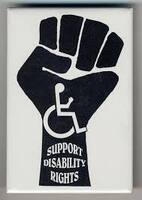
I say I was a pastor of a "white church," but we did actually have one African-American on the church roll. He was a 90-year-old, retired preacher, for whom it became too dangerous to drive across town to attend the “black church.” It was clear that some were not happy to have his picture in the church directory, but he was "tolerated" by most because, as I was told, he "behaves himself" in church.
Racial unity became my mission after I went off to college and formed social groups that for the first time included non-Caucasians. Years later, I meet Ms. Hattie. She attended the women’s study group on Thursday mornings at my church. "When are you going to come hear me preach?" I would always ask her. She would just chuckle and give an expression that communicated, "Boy, if you knew what I knew about some of the people in this church, you wouldn’t be asking me this.”
At the time, Ms. Hattie is well up into her 80s and lives in HUD housing. She doesn’t own a car, so whenever I meet her at the grocery store or see her walking along a street, I stop and offer her a ride. Each time I drop her off at her apartment, the last thing I say is, “You know, all you have to do is call, and I will come pick you up for church.” Every time, she communicates with her eyes, “You are a very sweet but naïve young man.”
After numerous lifts from the grocery store and kind gestures here and there, I develop a rapport with Ms. Hattie. Eventually, I confide in her the motive behind my inviting her to church. I assure her that I am not trying to proselytize and that I am only seeking an ally to help racially integrate my congregation. After about two years of persistent goodwill and gentle persuasion, one Sunday morning my phone rings.
As I am driving Ms. Hattie to church that first time, she tells me why she decided to call. “I was praying about it,” she begins. “And I said, ‘Lord, that boy really is not prejudiced, and he really wants me to go to church with him.’ So I picked up the phone this morning and called.”
Even though I was a pastor, it took many months of persistent kindness to break down a wall and prove to Ms. Hattie that I genuinely cared about her as a person and wanted her to help me confront racism in my church. All of this points to the discrimination she had faced in her lifetime, and doubtlessly including some perpetrated by my church members. I know that decades previously she served as a nanny to some of the families in my church. Consider of the book/movie “The Help” and you will get the picture of what her experiences would have been like.
“When we get to church, I want you to sit with my family,” I tell Ms. Hattie. I hate to admit it, but I am a little concerned how her presence will be received, and I want to try to shield her from any mistreatment. Sure, she has attended the women’s class on Thursday mornings, but the main service on Sunday is a horse of a different color. One need not attend many southern churches to discover that the Sunday morning service is sacrosanct.
As we walk in together and I escort Ms. Hattie down the center aisle, jaws of my church members are dropping. The whites of all their eyes and their uvulas are in full view, and some people are giving themselves whiplash. I do not know which of us is more nervous. I have not felt this many butterflies since I was in a locker room before a big game back in high school.
We take our seat. We sing hymns. We say prayers. I give my sermon. Through it all, Ms. Hattie sits relatively quiet and still. When the service ends, I drive her across town to her church because she did not want to miss their monthly dinner on the grounds. Her church receives me with open arms. We enjoy some good food, and then I take her home.
The next Sunday morning my phone rings again. After the third Sunday in a row that Ms. Hattie attends church with me, it starts happening. We walk into church the next service and at least six other African American guests are scattered throughout the pews. Emboldened by Ms. Hattie’s example, a couple of school teachers and coaches have invited some of their students and colleagues. Not only that, but also Ms. Hattie is becoming more comfortable. She begins to open up more, to sing more, to sway more, to raise her hands more, to shout more. Bless her heart, she even apologizes to me afterwards, “I don’t want to get you in trouble. I try to hold it in, but when that Spirit hits me, I just have to let it out.” I tell her that she never has to apologize for releasing some spirit inside the church and not ever to think she is causing any trouble for me.
My heart is full of joy, as I drive home, but in my mind I know that a backlash is imminent. Sure enough, the next morning the chairman of the church board pays a visit to my office. After a little small talk, he starts beating around the bush:
“Well, Mike, people are talking.”
“Oh, what about?”
“Well, they are wondering what you are up to?”
“‘What am I up to?’ What do you mean?” (I know good and well what he meant but perhaps part of me was engaging in wishful thinking).
“Well, bringing Ms. Hattie to church….”
My knuckles turn white on my interlocked fingers resting on my lap. I tell myself to stay calm and reply, “Well, she calls me and asks me to give her a ride to church, and I go pick her up. That’s what I’m up to.”
“Well, couldn’t she go to ‘Magnolia St. Church’”? (The “black church” on the other side of the tracks).
“I’m sure she could go there if she wanted to. I’ve never asked her about it.”
“Well, isn’t she a member of ‘Dogwood Ave. Church’”? (A different denomination’s “black church” in the same town.)
“Yes, I believe she is still a member. In fact, I took her to a potluck over there after services a few weeks ago.”
“Well, why does she want to come here?”
At this point it becomes difficult for me to keep my cool, but I do my best and answer, “I guess that’s a question to ask Ms. Hattie.”
Then, God as my witness, he says, “Well, we just don’t want to create any problems that we don’t already have.”
I feel my blood pressure rise. I lean forward in my chair and say respectfully but firmly, “I don’t believe for a second that my bringing a black woman to this church is creating any problem, but I do believe it is revealing a problem that we already have in the hearts of people.” I paused only for a second and then added, “And I believe God has called me to address heart problems.”
His nonverbals at this point communicate, “I was afraid you would say something like that,” but what comes out is, in a long southern drawl, “Well, you’re probably right.” With that he rises silently and departs, and I have an awful premonition. At the next church board meeting, the group of all white men pressure me to stop bringing Ms. Hattie to church. I counter by asking them to be true spiritual leaders and repent of the prejudice they are harboring. They retort, “We aren’t prejudiced; we gave Magnolia St. Church $50,000 to help build their building!”
I am stupefied by how oblivious they are to the irony in that statement. I respond almost laughingly in disbelief, “Really? You give $50,000 to the blacks so they can build their building on the other side of the tracks instead of worshiping here with you, and that is the proof you give that you are not prejudiced?”
At this meeting, the writing is clearly on the wall, and soon thereafter I decide to break the news of my pending resignation to Ms. Hattie. She feels guilty and thinks it is all her fault. I explain to her how it has now become a power struggle between me and the board. It is simply a case of church politics. I assure her that this is a fight that I chose, and although we might be losing the battle, we can still win the war.
“If the church is to have any hope of racial healing, then I have to go, but you can stay. You can continue to fight this good fight we’ve started,” I tell Ms. Hattie. We continue to talk about how it’s only a matter of time until some people will be ugly to her and pressure her not to attend, but that in the end our sacrifices might pay off. We both know that nothing will change until someone takes a stand. It cannot be me, despite how much I want it to be. If I stay and refuse to give in, I will be fired. To stay and be silent, however, is not an option. I must resign.
So I do and become pastor of a new church a few hours away. I would occasionally return for weddings and funerals and run into Ms. Hattie or call her on the phone. Bless her heart, a year later she was still attending my old church. “You have no idea, how much it means to me knowing that you are carrying on what we started,” I told her, and added, “Ms. Hattie, you are my legacy.” The thing I am most proud about my years at that church is the fact that she continued to attend after I left.
A few years later, I moved farther away and lost touch with Ms. Hattie. The last time I spoke to a friend from that church was some seven years later. I asked him about Ms. Hattie. “She still comes,” he said. “People don’t like it, but she still comes.” I smiled. No words. Just a long, satisfying smile, and heaven forgive me, but I couldn’t help but think, “Give ‘em hell, Ms. Hattie; you give ‘em hell!”


 RSS Feed
RSS Feed
